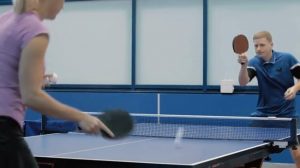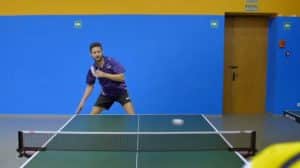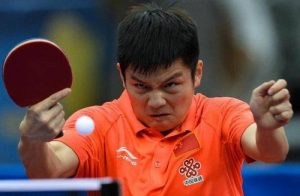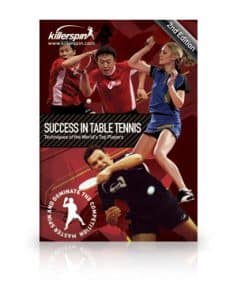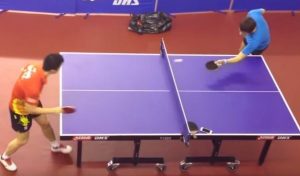The jump from a recreational table tennis player to a more competitive level can sometimes be challenging to motivate oneself to make–let alone a little intimidating.
If you’re at a stage where you feel you’d like to get more from the game and you honestly believe you have a bit to offer, chances are good that you owe it to yourself to see what you’re capable of doing.

Research a local recreational club and go out with a friend. Neither you nor your friend needs to be ready to compete with fifteen-year veterans your first time out; be able to sustain a rally, and you’ll be more than fine.
Watch what other people do and absorb information to improve your play’s quality and approach to the game. Things to look for include etiquette when playing with strangers, any minor variations in the rules you may have missed as a strictly recreational player, different players’ techniques for warming up and staying loose in between points, and any interesting in-game tactics that you could immediately implement.
An essential rule here is to play with strangers: this will give you a feel for how you stack up against a random selection of players a bit more serious than you; it’ll make you learn to respond to the different, possibly more polished styles of play and you might meet some nice who has a few tips to share.
Other advantages to being familiar with a local club include access to new, higher quality equipment, equipment repair opportunities, and the possibility of lessons if that interests you.
The last rung on the ladder guiding you to a more competitive play level is participating in a tournament.
Local clubs offer those chances if they interest you; tournaments are usually organized by age group and skill level, so you’re virtually assured of not being dramatically overmatched right out of the gate.
You should find that many of the tournament players are first-timers like yourself and after a bit of regular play, who knows how you could feel about moving up a competition level or two!
Overcoming a Plateau of Progression
Let’s talk about progress in table tennis, how we can improve as table tennis players, and what to do if you think you’ve hit a plateau.
Let’s think about a scale from a non-player to a world champion, with all the steps in between social player, local league, tournament player, county level, national, etc. It’s effortless to climb the scale initially – from being a non-player to a social player is an easy transition!
As we move up the scale, it becomes challenging to move further up, and the tiniest improvements can make a difference – it’s much harder to move from a national player to a world champion.
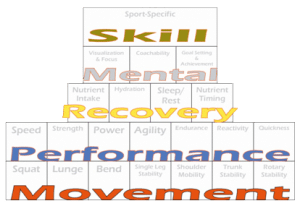
As a beginner, progress happens quickly and frequently. You can make vast improvements in a very short space of time. For example, if somebody starts playing and can’t hold a bat properly, you can quickly teach them the proper grip. That’s a massive improvement! Within an hour, you can have them playing a few forehands in a row, for example. Again, a significant improvement.
While we can continuously improve technique, improvements further up the scale can often be physical, mental, or tactical. It’s helpful to break your game down into small pieces to see where exactly you are improving, rather than just thinking generally that ‘I’m not playing well at the moment’ etc.
It can be challenging to spot progress as you move up the scale, and if you feel like you’ve hit a plateau, it can be demotivating, and in turn, that can lead to poor mentality and a decline in your game. That’s why it’s so common for teenagers to give up the sport – they’ve been improving their whole sporting career and all of a sudden feel like they’ve hit a brick wall.
Here are a few ideas for if you feel a plateau in your progression:
Take a break
If you’re feeling fed up, it can help you take a break and come back with a renewed energy for the game. You’re not going to improve if you’re not enjoying it.
Monitor your training
You can track your progress during training. It can be as simple as counting how many strokes you can do without a mistake or monitoring fitness in that part of the training.
Join a higher-level league
It is probably the best one, in my opinion. A fresh challenge is always good, and many improvements are now going to be learned in match play. A real good win can be a great confidence-booster, but you’re going to learn more from the losses.
For example, a few nights ago (you can read my rant about it here), if I’d won, and somebody asked me why I’d probably say I was lucky on the night, played well, and played positively.
But I lost, so I’ve (hopefully) learned to deal with the situation of being ahead against a reputable player, the importance of playing positively till the end, not letting up when ahead, and that I need to work on playing against slower spin, rather than a quick game.
Related post:
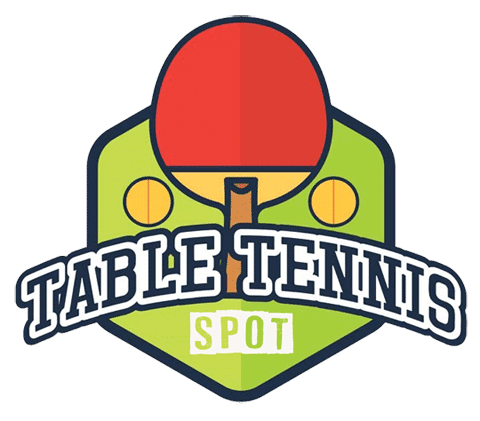
Warren Davies

